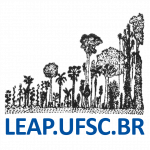Applied Ecology Lab (English)
The Applied Ecology Lab at the Federal University of Santa Catarina (UFSC) in Brazil works on connecting plant functional trait diversity and agroecological management effects on agroecosystem multifunctionality, mainly in successional or syntropic agroforestry. Continuous exchange between research, teaching and outreach with practitioners and decision makers maintains a vibrant synergy between theoretical understanding and active social-ecological transformation toward restoration and conservation of biodiversity through sustainable use.

We show how biodiversity increases food production and catalyzes rainforest restoration through its sustainable use: Mixing crops with varying heights and leaf traits prevents weed invasion, increases soil cover and crop yield at the same time without agrochemicals in the same young agroforest plots in Brazil (Santos et al. 2021 J. Appl. Ecol.).

We demonstrate in permanent experimental plots that crop functional trait diversity drives agroecosystem multifunctionality during the challenging establishment phase of low-input agroforest succession. Crop functional diversity was responsible for complementary occupation of ecological niches, which optimized total crop light interception and thereby simultaneously maximized weed suppression, soil protection and crop yield (Santos et al. 2021 J. Appl. Ecol.).




